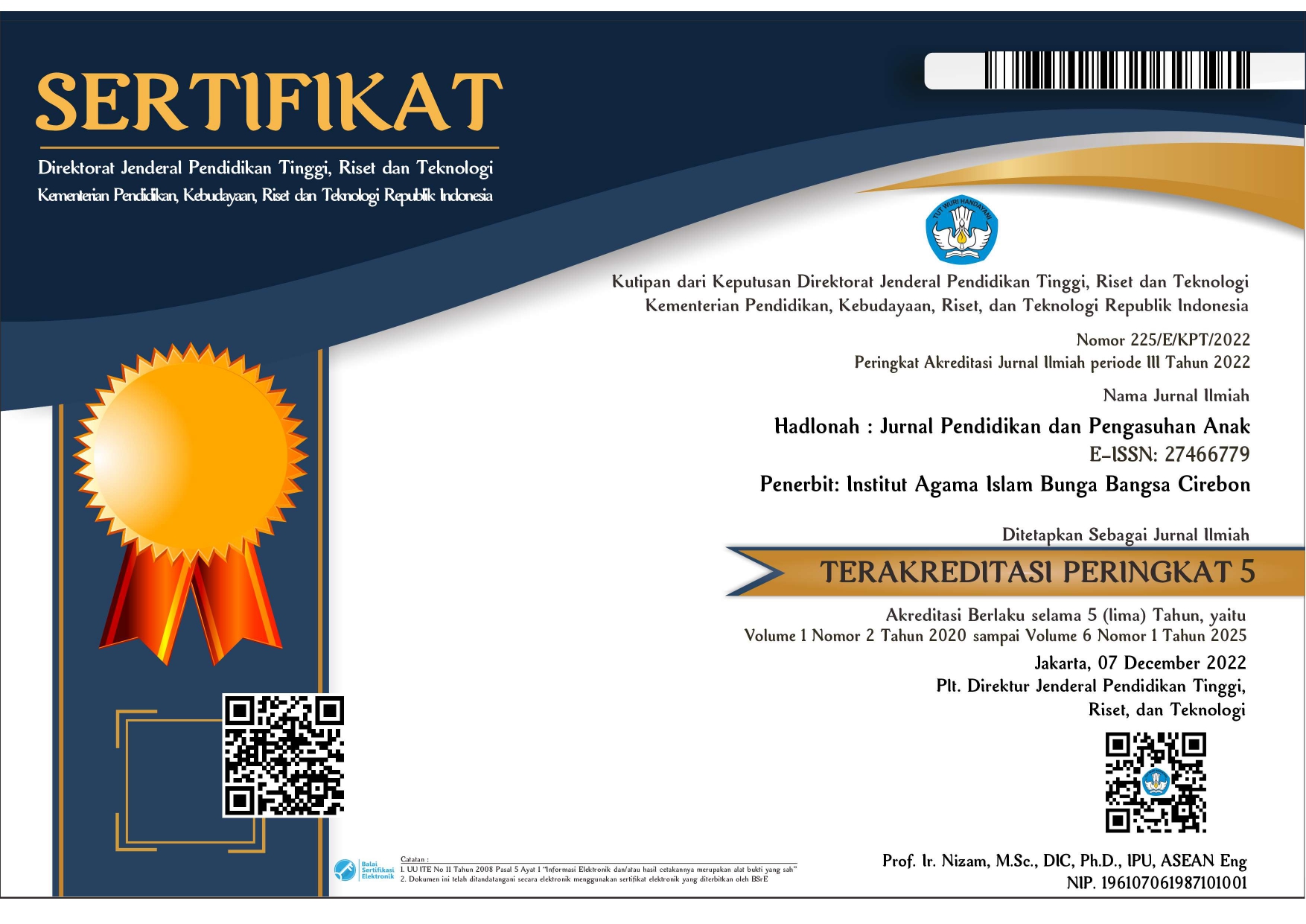Peran Guru dalam Asesmen Kesehatan Mental Anak Usia Dini di Lingkungan PAUD ABA Lamongan
Abstract
Early childhood mental health problems are increasingly receiving attention in various countries, because they have a significant impact on children's future cognitive, social and emotional development. Early childhood is very sensitive to environmental stimulation, both positive and negative (Raver, 2002). Various studies show that mental health disorders in early childhood, such as anxiety, stress, and behavioral problems, can have long-term impacts on children's psychological development, both academically and socially. The aim of this research is to analyze the relationship between the role of teachers and the mental health of early childhood in Early Childhood Education (PAUD) institutions. The method used is a quantitative descriptive method. This research involved 30 PAUD children in Lamongan who were selected using purposive sampling. The instruments used include a Likert scale-based questionnaire to measure the teacher's role, as well as the Strengths and Difficulties Questionnaire (SDQ) to assess children's mental health. The research results show that there is a positive and significant relationship between the role of teachers and children's mental health with a correlation value of 0.425 (p < 0.05), indicating that the active role of teachers in providing emotional support influences children's emotional stability and social skills. In addition, it was found that 66.67% of teachers were effective in supporting children's mental health
Downloads
References
Durlak, J. A., Weissberg, R. P., Dymnicki, A. B., Taylor, R. D., & Schellinger, K. B. (2011). The impact of enhancing students’ social and emotional learning: A meta-analysis of school-based universal interventions. Child Development, 82(1), 405-432.
Guhn, M., Gadermann, A. M., & Zumbo, B. D. (2010). Health and well-being in middle childhood: Associations with school experiences and social-emotional development. Social Indicators Research, 98(2), 287-305.
Domitrovich, C. E., Gest, S. D., Jones, D., Gill, S., & Sanford DeRousie, R. M. (2008). Implementation quality: Lessons learned in the context of the Head Start REDI trial. Early Childhood Research Quarterly, 24(1), 3-14.
Gunter, L., Caldarella, P., Korth, B. B., & Young, E. L. (2016). Promoting social and emotional learning in preschool students: A study of Strong Start Pre-K. Early Childhood Education Journal, 44(5), 339-347.
Kusuma, E. (2019). Peran Guru PAUD dalam Menangani Masalah Kesehatan Mental Anak Usia Dini. Jurnal Pendidikan Usia Dini, 13(2), 123-135.
Kementerian Pendidikan dan Kebudayaan Republik Indonesia (Kemdikbud). (2013). Panduan Pengembangan Pembelajaran PAUD Holistik Integratif. Jakarta: Kementerian Pendidikan dan Kebudayaan.
Denham, S. A., Bassett, H. H., & Wyatt, T. (2009). The socialization of emotional competence. In M. H. Bornstein (Ed.), Handbook of socialization: Theory and research (2nd ed., pp. 614–637). Guilford Press.
Erikson, E. H. (1963). Childhood and society (2nd ed.). W. W. Norton & Company.
Goldfield, G. S., Harvey, A., Grattan, K., & Adamo, K. B. (2015). Physical activity promotion in the preschool years: A critical period to intervene. International Journal of Environmental Research and Public Health, 12(2), 2126–2142. https://doi.org/10.3390/ijerph120202126
Goodman, R., Ford, T., Simmons, H., Gatward, R., & Meltzer, H. (2000). Using the Strengths and Difficulties Questionnaire (SDQ) to screen for child psychiatric disorders in a community sample. British Journal of Psychiatry, 177(6), 534–539. https://doi.org/10.1192/bjp.177.6.534
Kemendikbud. (2021). Survei kesehatan mental anak usia dini di Indonesia. Kementerian Pendidikan dan Kebudayaan RI.
Mashburn, A. J., Justice, L. M., Downer, J. T., & Pianta, R. C. (2008). Peer effects on children’s behavioral development in pre-kindergarten classrooms. Child Development, 79(3), 732–749. https://doi.org/10.1111/j.1467-8624.2008.01153.x
Muro, M., & Jacob, S. E. (2016). The role of teachers in the assessment of mental health in early childhood education. Journal of Early Childhood Education Research, 5(2), 45–58.
Pianta, R. C. (1999). Enhancing relationships between children and teachers. American Psychological Association. https://doi.org/10.1037/10314-000
Rimm-Kaufman, S. E., & Pianta, R. C. (2000). An ecological perspective on the transition to kindergarten: A theoretical framework to guide empirical research. Journal of Applied Developmental Psychology, 21(5), 491–511. https://doi.org/10.1016/S0193-3973(00)00051-4
Roeser, R. W., Eccles, J. S., & Sameroff, A. J. (2014). School as a context of early adolescents' academic and social-emotional development: A summary of research findings. Elementary School Journal, 113(1), 35–58. https://doi.org/10.1086/664483
Squires, J., Potter, L., & Bricker, D. (2002). The ASQ User’s Guide for the Ages & Stages Questionnaires: A Parent-Completed, Child-Monitoring System. Paul H. Brookes Publishing.
World Health Organization. (2019). Guidelines on mental health promotive and preventive interventions for adolescents. WHO Guidelines.
Zinsser, K. M., Christensen, C. G., & Torres, L. (2013). She’s supporting them; who’s supporting her? Preschool center-level social-emotional supports and teacher well-being. Journal of School Psychology, 51(5), 599–610. https://doi.org/10.1016/j.jsp.2013.07.002

















